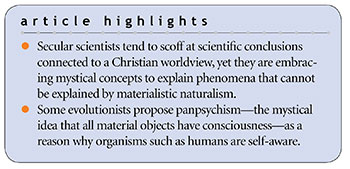 Evolutionary secularists often fancy themselves as hard-nosed empiricists who are immune to the allures of “magical” thinking. However, as the inadequacies of materialistic naturalism become more and more obvious, we shouldn’t be surprised to see them embracing mystical ideas—a trend noted by ICR founder Dr. Henry M. Morris more than 30 years ago.1
Evolutionary secularists often fancy themselves as hard-nosed empiricists who are immune to the allures of “magical” thinking. However, as the inadequacies of materialistic naturalism become more and more obvious, we shouldn’t be surprised to see them embracing mystical ideas—a trend noted by ICR founder Dr. Henry M. Morris more than 30 years ago.1
The origin of life and the origin of consciousness are arguably the two most difficult things for evolutionists to explain. They must insist that life somehow came from non-living chemicals even though there is zero experimental evidence for this.2
The origin of life and the origin of consciousness are arguably the two most difficult things for evolutionists to explain. ![]()
Another naturalistic puzzle is that if humans are nothing more than material, biological machines, why are they self-aware? And if humans are just biological machines, why don’t other machines such as personal computers possess consciousness? Some evolutionists think they have an answer—a personal computer is conscious. And not just personal computers, but everything else in the universe! This belief, called panpsychism, holds that consciousness is a fundamental feature of matter itself, not just something humans possess. According to panpsychism, everything has some rudimentary level of consciousness, even individual particles.
If this were true, then a self-aware object could perhaps move by its own volition apart from any outside influences. Incredibly, this is what some scientists are actually suggesting. Astronomer and physicist Gregory Matloff theorized that some stars can consciously alter their motions. Two of the mechanisms he proposed for this are jets of material a star purposefully emits in just one direction and, I kid you not, a psychokinetic force!3
It’s hard to believe that evolutionary scholars, who pride themselves on their supposed adherence to hard science, would actually suggest such things. It’s also hard to see how modern science could have ever come about if such an intellectual environment had existed centuries ago.
It’s hard to believe that evolutionary scholars, who pride themselves on their supposed adherence to hard science, would actually suggest such things. ![]()
The Bible provides a reasonable explanation for the existence of life and consciousness, both of humans and animals (Genesis 1:20-31, 2:7). God created mankind, and we have both an immaterial, spiritual component and a physical one. Likewise, the “higher” animals possess a possibly lesser form of nephesh consciousness, according to Genesis 1:21. But because evolutionists reject the Bible’s explanation, they are forced to propose ideas that have the potential to undermine not just future scientific advancements but also the vast scientific knowledge that has already been attained!
For instance, why use Newton’s Laws of Motion to infer an object’s path through space if the object can change its own motion at will? If an object starts to move, did it move because an unbalanced external force acted on it or because the object chose to move? Do secular physicists really want to go down this path? And if they do, what is this going to do to science—especially physics?
Evolutionists claim that acceptance of creation thinking will stifle scientific progress, but the exact opposite is true. We have modern science today largely because the founders of science had a Christian worldview.4 Yet, many of today’s scientists are determined to reject that worldview, regardless of the consequences for science. Such irrational behavior cannot be motivated by a love of knowledge or science but rather seems to indicate a disdain for the Creator and a desire to banish Him from their thoughts.
The Bible provides a reasonable explanation for the existence of life and consciousness, both of humans and animals. ![]()
This is one more reason why the creation vs. evolution controversy is not just a side issue. What one believes about origins is of immense practical importance. All scientists need to humble themselves before their Creator and get back to Genesis.
References
- Morris, H. M. 1987. Evolution and the New Age. Acts & Facts. 16 (3).
- Tomkins, J. P. 2018. The Impossibility of Life’s Evolutionary Beginnings. Acts & Facts. (47) 3: 11-14.
- Matloff, G. L. 2017. Stellar Consciousness: Can Panpsychism Emerge as an Observational Science? EdgeScience. (29): 9-14.
- Hebert, J. 2016. How Theology Informs Science. Acts & Facts. 45 (5): 14.
* Dr. Jake Hebert is Research Associate at the Institute for Creation Research and earned his Ph.D. in physics from the University of Texas at Dallas.






















